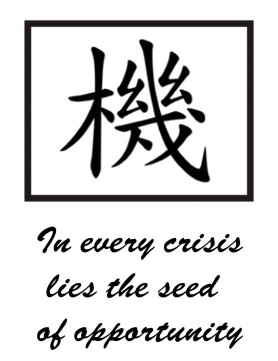A crisis is any situation, be that a legal dispute, theft, accident, natural or manmade disaster, that could threaten the integrity or reputation of a company. Additionally, a crisis can occur if the media or the general public believes a company did not react to a situation in an appropriate manner.
Most crises do not occur out of the blue. However, that does not make dealing with a crisis any easier. When faced with a crisis, a company can view it as an obstacle or an opportunity. Obviously the better option would be to turn the crisis into an opportunity, and if handled correctly the damage to your company can be minimized.

Having a crisis communication team intact is crucial. This could include the CEO, the head of the Public Relations department, safety and security office and legal counsel. The job of the crisis communication team is to decide a plan of action and select a company spokesperson.
The best action to take when faced with a crisis is to remain calm, tell the truth and tell it in a timely manner. Never ignore a situation because that will only make it worse. Put yourself in the situation of whoever is in the crisis and try to view it from their perspective. Then decide how to best position your company to the public eye. Remember that the goal is to protect the integrity and reputation of the company.

Being in the public eye can have its advantages and its drawbacks, and
Kitson is no exception. Being one of the most celebrity-saturated boutiques in Hollywood, Kitson gets a lot of media attention. However, not all media attention is positive and sometimes being in the limelight can be inconvenience.
In 2006, Kitson was in an ugly legal dispute with the tabloid
Us Weekly. Kitson declared that Us Weekly was intentionally omitting any mention of the store in its issues because of prior legal disagreements. The quarrel between the two parties began early in the year when an Us Weekly editor threw a private charity party at Kitson and never paid for it. The feud finally went public when the magazine called the boutique a snob.
 The crisis: the lack of publicity in Us Weekly was costing Kitson $10,000 a week.
The crisis: the lack of publicity in Us Weekly was costing Kitson $10,000 a week.
How should the company have dealt with the situation? Kitson should have used the lack of exposure in Us Weekly as an opportunity to reach out to other media outlets. By granting VIP access to launch parties and celebrity appearances, Kitson could have improved relations with the other tabloids. Acting proactively could have saved Kitson a lot of stress and money.
The benefit of dealing with a crisis is learning from the experience. In the future, if Kitson has to go to battle with another tabloid they will already have a crisis plan intact. To read more juicy gossip between Kitson and Us Weekly
click here!

Peace, love & fashion!!





 Having a crisis communication team intact is crucial. This could include the CEO, the head of the Public Relations department, safety and security office and legal counsel. The job of the crisis communication team is to decide a plan of action and select a company spokesperson.
Having a crisis communication team intact is crucial. This could include the CEO, the head of the Public Relations department, safety and security office and legal counsel. The job of the crisis communication team is to decide a plan of action and select a company spokesperson.


